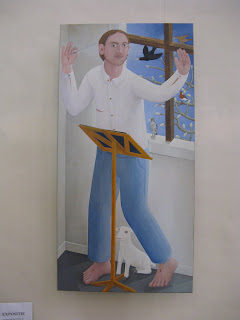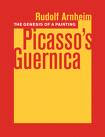Wednesday, April 29, 2009
The Worldview Behind the Work of Art: Five Cautionary Statements
1. Works of art do not have worldviews; they are to lesser and greater degrees shaped by them. People have worldviews.
2. Analysing the worldview of a work of art sometimes offers the critic a false sense of confidence upon which to base judgements. A work of art is not ‘better’ because it has clearly been shaped by one coherent worldview.
3. Worldviews are exclusive. They have the unfortunate consequence of putting works of art in the misleading categories of ‘Christian worldview’ or ‘secular worldview.’ While the magician may be able to pull these convenient rabbits out of his hat, it seems plain that works of art generally dwell within the grey areas between worldviews. In view of an accurate understanding of a work of art, it may not even be desirable to categorize a work of art according a worldview that appears to lie behind it.
4. A worldview is only one aspect of many that contribute to the meaning of a work of art. It is not, as Flannery O’Connor cautions us, ‘the string that a sack of chicken feed is tied with.’ Some folks might be under the impression that if you pick out the worldview ‘the way you pick the right thread in the chicken-feed sack, you can rip the story open and feed the chickens.’
5. The purpose of appreciating a work of art is not to determine the worldview that shaped it, but to allow the work of art to shape, challenge, question, and enrich our own worldviews.
Tuesday, April 21, 2009
The Redemptive Vision of Charles Williams
The following quote is basically what I was trying to describe to Emily. I was blundering about trying to understand what it means to 'know the good as evil.' Emily did not really like this idea, but as we will see Williams' notion that 'man desired to know schism in the universe' is grounded in Adam and Eve's desire to be as God. Williams describes the Fall this way:
'It was merely to wish to know an antagonism in the good, to find out what the good would be like if a contradiction were introduced into it. Man desired to know schism in the universe. It was a knowledge reserved to God; man had been warned that he could not bear it – ‘in the day that thou eatest thereof thou shalt surely die.’ A serpentine subtlety overwhelmed that statement with a grander promise – ‘ye shall be as gods, knowing good and evil.’ Unfortunately to be as gods meant, for the Adam, to die, for to know evil, for them, was to know it by pure intelligence and by experience. It was, precisely, to experience the opposite of good, that is the deprivation of the good, the slow destruction of the good, and of themselves with the good.' (20)
Williams then goes on to describe the affects of sin on Adam and Eve. I like what he says for two important reasons: (1) it anticipates William's theology of redemption and (2) it is funny. Here's what he says:
'They made themselves aprons. It was exactly what they had determined. Since then it has often been thought that we might recover the single and simple knowledge of good in that respect by tearing up the aprons. It has never, so far, been found that the return is so easy. To revoke the knowledge of unlovely shame can only be done by discovering a loveliness of shame (not necessarily that shame, but something more profound) in the good. The Lord, it may be remarked, did not make aprons for the Adam; he made them coats. He was not so sex-conscious as some of the commentators, pious and other.' (21)
The affect of the Fall is reversed in the Passion and Ressurection of Christ. It is in the Passion that Christ knows evil in deprivation of all good, and in the Resurrection that the world can know evil as good. Williams writes:
'The knowledge of good and evil which man desired is offered as the excuse for their false knowledge of good. But the offer brings their false knowledge into consciousness and will no longer like the prophets blot it out. The new way of pardon is to be different from the old, for the evil is still to be known. It is known, in what follows, by the Thing that has come down from Heaven. He experiences a complete and utter deprivation of all knowledge of the good.' (57)
'The Passion and the Resurrection have been necessarily divided in ritual and we think of them as separate events. So certainly they were, and yet not as separate as all that. They are two operations in one; they are the hour of the coming of the kingdom. A new knowledge arises. Man had determined to know good as evil; there could be but one perfect remedy for that – to know the evil of the past itself as good, and to be free from the necessity of the knowledge of evil in the future; to find right knowledge and perfect freedom together; to know all things as occasions of love.' (58)
This ultimate reversal of the Fall is anticipated in the Incarnation, for it is here that humanity's desire to be as God is reversed by God's becoming as man:
'Men were never meant to be as gods or to know as gods, and for men to make any such intention a part of their pardon is precisely to try to behave as gods. It is the renewal of the first and most dreadful error, the desire to know as gods; the reversal of the Incarnation, by which God knew as Man, the heresy of thought and action denounced in the Athanasian Creed – it is precisely the attempt to convert the Godhead into flesh and not taking the manhood into God.' (60)
Saturday, April 18, 2009
Society for the Study of Theology and Amsterdam
I have been absent from the blogosphere for a couple months, and it feels good to be back. I am especially excited to share my recent trip to the Society for the Study of Theology Conference in The Netherlands. Sadly, I do not have any pictures from the conference itself. It was tempting to snap some pictures of all the 'famous' theologians who were there, but I held back. I didn't even ask for an autograph.
The conference was a lot of fun, and I met some great folks. Every night there was 'bar time,' which was a great opportunity to meet people and to discuss theology without the consequence of anyone actually remembering what you said.
I attended more papers than I have fingers to count. There were times when I felt a bit overloaded with theology. Listening to papers can actually be exhausting after awhile. A number of my friends from St Andrews offered papers at the conference, and they were all, of course, excellent. I think there were 8 (2 profs and 6 phds) of us from St Andrews total: strength in numbers. I also had the opportunity to give a paper at the conference on the relationship between creativity and vulnerability. This was a much more intimidating venue than Durham.
After the conference, some St Andrews friends (David and Joy Sonju, Shawn and Sarah Bawulski) and I did a bit of sight seeing in The Netherlands. Our first stop was the beautiful town of Utrecht (I believe this is the 'Utrecht' of 'Utrecht Art Supplies'). We visited its remarkable medieval cathedral and tower. Below is a view through the passageway underneath the tower looking towards the cathedral.










